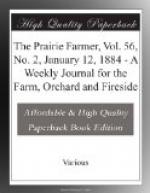Premiums are to be offered for tools, implements and appurtenances used in the coal mining and handling industry of the State.
Premiums for poultry have been increased, and an expert will be selected to do all the judging in the poultry department.
The chicken exhibit at the Fat Stock Show will not be continued.
The committee of dairymen appointed at the late meeting of the Illinois Dairymen’s Association did not present themselves at the State Board meeting to confer about holding a dairy exhibit either at the State Fair or the Fat Stock Show, as instructed to do. No explanation of the failure was made. The State Board, however, to leave nothing undone to establish its desire to meet the dairymen half way or more, appointed a committee consisting of Messrs. David, Chester, and Griffith, to confer with the DeKalb committee, in Chicago, at some convenient time to be agreed upon.
It was decided to hold the next Illinois State Fair at Chicago the week beginning September 8th, and the Fat Stock Show at the Exposition Building, Chicago, beginning November 11th.
SORGHUM AT WASHINGTON.
Prof. Wiley, of the Department of Agriculture at Washington, will soon issue his report upon the sorghum business of 1883. Newspaper correspondents have been permitted to make a digest of the report. He pronounces erroneous the prevalent impression that every farmer may become his own sugar-maker. Sorghum, unlike sugar beet, contains various non-crystallizable sugars, the separation of which demands much skill and scientific knowledge. Sorghum-sugar will have to be made in large factories. The existing factories have shown that it can be made, but how profitably or unprofitably can not be stated by Prof. Wiley, who suggests that farmers near factories may, in effect, make their own sugar by raising the cane and trading it at factories for sugar. Cane giving sixty pounds of sugar per ton ought to bring the farmer thirty-five pounds, the rest of the sugar and molasses going to the manufacturer to pay expenses and yield profit. The profitableness of making sugar from sorghum depends largely on utilizing all waste products. The scums and sediments make manure hardly inferior to guano. Bagasse, or crushed cane, can be turned into manure by being thrown into hog-pens, as at Rio Grande, N.J., or it will make a fair quality of printing paper. It is not economical to burn it. If the manufacture of sorghum-sugar is proved to be profitable, it will result in supplying to a large extent our demand for sugar, but as sorghum makes a great deal more molasses in proportion to sugar than sugar-cane does, the Professor concludes that when there is enough sugar there will be a great deal more molasses than can be disposed of.




